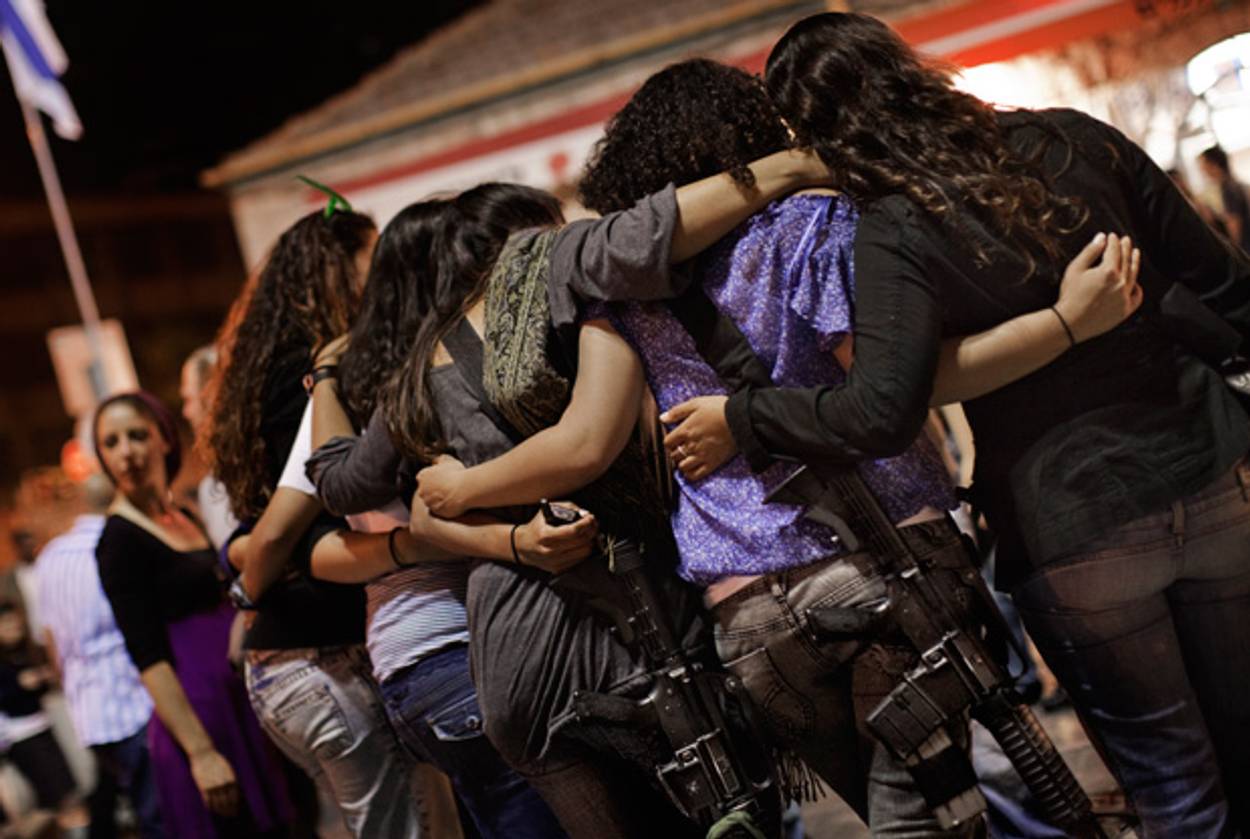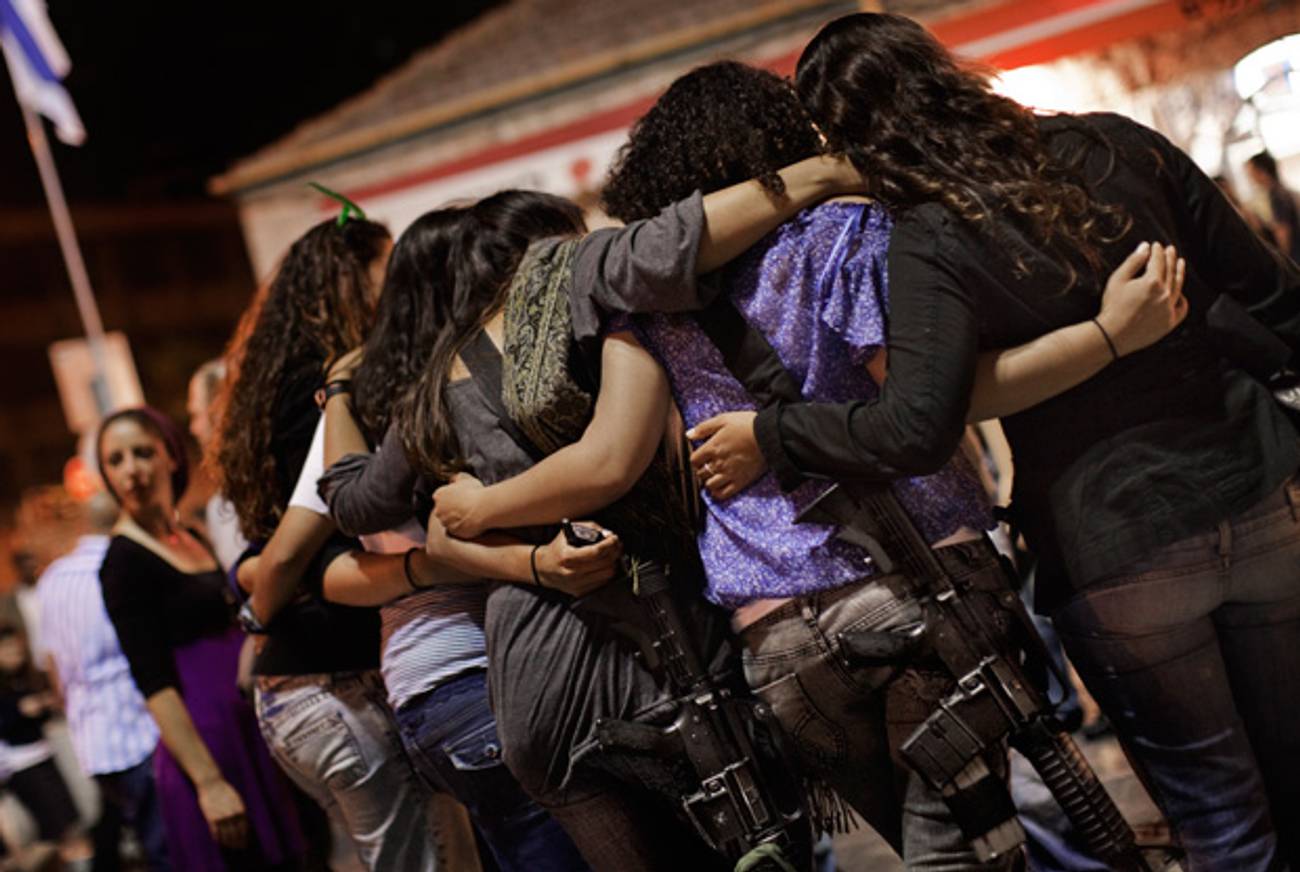Why Israel Has No Newtowns
It’s the Jewish state’s gun culture, not its laws, that prevents mass shootings like the one in Connecticut




Why? In the days since 27 innocents, most of them children, were murdered in Sandy Hook Elementary School, all have been asking that question, trying to make sense of an ultimately senseless act. Simpler minds insisted that anyone who has ever argued in favor of anything but the absolute abolition of firearms was complicit in the murder of innocent children, while more astute thinkers tried to look past their indignation and heartbreak in search of sensible policy alternatives. Not surprisingly, they often ended up looking to Israel, a nation, went the argument, whose citizens are heavily armed yet rarely use their guns to shoot each other. This, more than one report noted, was due largely to Israel’s surprisingly strict gun-control legislation: Assault rifles are banned, registration is necessary, and a whole system of checks and requirements is in place to keep weapons out of the wrong hands. A popular statistic spread like wildfire on Facebook and Twitter: Only 58 Israelis were killed by guns last year, compared with 10,728 Americans.
It’s a compelling story. It’s also wrong: There’s much that we can learn from Israel when it comes to firearms, but it’s the state’s gun culture, not its gun laws, that keeps its citizens safe.
***
Let us, for the sake of argument, put aside the fact that nearly all Israelis serve in the army, and that virtually all soldiers are armed with semiautomatic weapons that they carry on their person at all times, even when back home on vacation. Most men continue to enjoy this unfettered access to arsenals for the duration of their service as army reservists (at least a few weeks out of each year until they’re 45). If we disregard the glut of guns facilitated by the Israel Defense Forces, we are left with strict-sounding laws that require anyone who wants a firearm license to register with the government and meet a list of seemingly stringent conditions.
To receive a gun license, one technically needs to meet two sets of criteria. First, the basics: A gun owner must be a citizen or a permanent resident and speak some Hebrew. The person can’t be a minor and can’t have any physical or mental problems hindering him from operating a firearm. Second, one must show cause to carry a weapon, a privilege limited on paper to about a dozen categories of people whose work conditions are perilous enough to justify carrying a firearm.
These are the strict gun laws that many commentators have been citing as the reason the Jewish state has no Newtowns or Columbines. But take a closer look, and that second set becomes quite porous: Security guards, obviously, are permitted their guns, but so are men and women who work in the diamond industry, or who handle valuable goods or large sums of cash. Anyone who lives or works in an “entitled residency”—code for a high-risk area, meaning the settlements—is permitted a weapon, no questions asked. Retired army officers can easily obtain a license, as can anyone who has inherited a gun from a friend or a relative. And sportsmen can easily get shotgun permits if they claim that they wish to use it to hunt pheasant or boar.
The upshot: Anyone can come up with an excuse to legally own a gun. I have personally witnessed more than one friend apply under false premises, claiming that their work required that they travel to settlements and other high-risk areas, and walk out, a short while later, with pistols much like the ones used in Aurora or Columbine. Assault rifles, admittedly, are harder to come by in Israel. If you are not a soldier or a reservist or don’t have one in your family—again, nearly the entire population—the only way to obtain semiautomatics is if you reside, or claim to reside, in a settlement.
It doesn’t take much of an expert to realize that these restrictions, in and of themselves, do not constitute much by way of gun control. And even though there have been no Newtown-style mass shootings in Israel, the Israeli government has tightened the reins over the past decade, passing a series of additional restrictions and placing further emphasis on enforcement. The result was clear: In 2000, there were approximately 400,000 legally owned firearms in Israel, the majority of them handguns, and the number of illegal weapons stood at about 150,000. Ten years later, thanks largely to the new strictures, the ratio was reversed: 180,000 firearms were legally licensed, and more than 400,000 were illegally obtained, most of them assault rifles like the M-16 and the Galil, stolen from the Israel Defense Forces. Naturally, this led to an increase in the number of casualties, as it placed far mightier tools in the hands of criminals who were previously content to handle their affairs using the perfectly legal and readily available guns at their disposal.
When the ground beneath the argument about the availability of guns became shaky, some pundits pivoted to the issue of ammunition, which Israelis, with some exceptions, are allowed to legally purchase in limited quantities, usually no more than 50 rounds per year. Even if we disregard the relative ease of obtaining more bullets—the army is always a handy source, as are shooting ranges, which sell as many bullets as one wants and rarely check at the door to see how many rounds each customer actually fired and how many were squirreled away—talk of limiting ammunition remains unconvincing. Dylan Klebold, for example, committed most of his Columbine massacre using a TEC-9 handgun, which he fired a total of 55 times. Nearly any Israeli citizen could have fired the same number of bullets without breaking any law, and some—from the homicidal Baruch Goldstein to Eden Natan-Zada, a soldier who shot up a bus full of Israeli Arabs—did.
How, then, to explain Israel’s relatively low rate of gun-related deaths? For Lior Nedivi, an independent firearms examiner in Jerusalem and the co-author of a comprehensive report comparing Israel’s gun laws and culture to that of the United States, the answer lies far from the law books. “An armed society,” Nedivi wrote, quoting the science fiction writer Robert A. Heinlein, “is a polite society. Manners are good when one may have to back up his acts with his life.” It may be a bit odd to think of Israeli society as polite, but when it comes to guns it is, and for just the reason articulated by Heinlein: When everyone has a gun, guns are no longer seen as talismans by weak, frightened, and unstable men seeking a sense of self-validation, but as killing machines that are to be handled with the utmost caution and care.
***
If the United States, itself awash with weapons, wishes to benefit from Israel’s experience, it must make sure it learns the right lessons. The first and most universal one is that ever more stringent gun control is bad policy: As is the case with drugs, as was the case with liquor during Prohibition, the strict banning of anything does little but push the market underground into the hands of criminals and thugs. Rather than spend fortunes and ruin lives in a futile attempt to eradicate every last trigger in America, we would do well to follow Israel’s example and educate gun owners about their rights and responsibilities, so as to foster a culture of sensible and mindful gun ownership.
This is possible even in a society that doesn’t send each and every one of its sons and daughters to the army. One of my earliest memories involves waving a toy gun around, playfully pointing it at my father; I was 5 or 6 years old, and thought the whole thing great fun. My father, however, was unamused. Sternly, he looked at me and told me I should never point a gun at anything I didn’t truly intend to kill.
The lesson stuck. Later in life, he took me shooting, drilling into me the fundamentals of gun safety from a very young age. He was hardly alone in taking such an attitude. Go to any shooting range in Israel, as a soldier or a civilian, and the instructor is likely to talk about responsibility even before he or she begin to cover the basics of shooting. Those of us who are passionate about firearms should pursue the same path. I was dismayed to observe the National Rifle Association, an organization to which I belong, remain silent in the aftermath of the Newtown massacre; any organization that takes gun ownership seriously should dedicate itself not only to rights but to duties as well and provide its members with the resources to teach themselves and their children the same lessons my father taught me. The NRA should have been the first to vehemently condemn the shooting. Then they should have used the plethora of platforms at their disposal—including three magazines and a robust presence on social media—to assert the values that unite the many of us who are responsible and mature gun owners and who spend just as much time thinking about a gun’s tremendous potential for destruction as they do thinking about its muzzle velocity.
Finally, there’s one more crucial, and tragically ignored, point to consider. In the aftermath of Friday’s shooting, a mother named Liza Long wrote a powerful essay in which she recounted the difficulties of raising her mentally ill son. A brilliant child, he is nonetheless prone to occasional fits of rage and violence. When she looked at the shooter this past Friday, Long felt a chilling sense of recognition.
“I am sharing this story because I am Adam Lanza’s mother,” she wrote. “I am Dylan Klebold’s and Eric Harris’s mother. I am James Holmes’s mother. I am Jared Loughner’s mother. I am Seung-Hui Cho’s mother. And these boys—and their mothers—need help. In the wake of another horrific national tragedy, it’s easy to talk about guns. But it’s time to talk about mental illness.”
Amen to that. In Israel, still a somewhat socialist country, mental health services are ready available, for free, to anyone. And because so many young Israelis undergo traumatic experiences in the course of their military service, a whole host of nonprofit organizations are on hand to provide counseling and treatment. We must do the same. Rather than pretend that it was the objects in their hands rather than the afflictions in their minds that led Lanza and Holmes and Cho and the others to perpetrate their monstrosities, we should offer help to those young men and their families. We have no more compassionate route, and no greater hope for peace.
***
Like this article? Sign up for our Daily Digest to get Tablet Magazine’s new content in your inbox each morning.
Liel Leibovitz is a senior writer for Tablet Magazine and a host of the Unorthodox podcast.
Liel Leibovitz is editor-at-large for Tablet Magazine and a host of its weekly culture podcast Unorthodox and daily Talmud podcast Take One. He is the editor of Zionism: The Tablet Guide.